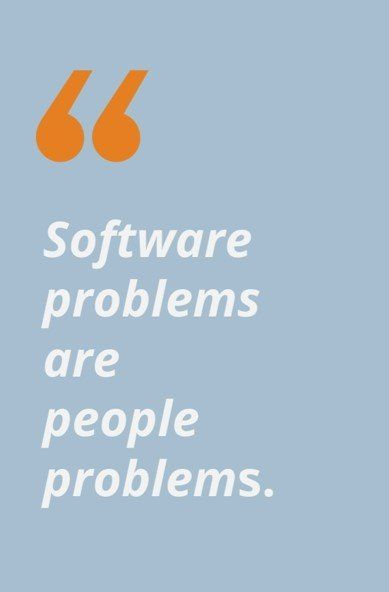Your great startup CTO gave their notice today, and you're wondering what to do next. It stings because you suddenly hear that they are no longer interested in the company and want to pursue new challenges. What happened? Your business was booming, so why is your chief engineer no longer interested in working on your projects? Depending on what stage of growth your business is in, this could be a terrible thing or a good opportunity to make a better choice. I will give you new insights into the technology personality types so that your next hire in this area is a better fit.
Hiring a new Chief Technology Officer is a big deal because if you hire one with competencies that do not match the stage your business needs most now, you have bought real trouble for your company. Let's keep you out of trouble and help you hire a CTO that gets your tech stack to the next power stage.
I have more than a bit of experience in this area of connecting the right people to get tech projects out the door, under budget, and fast to market. I also have scars that came from my experiences in building dozens of systems, hundreds of system integrations, and several mobile apps. It is challenging to make daily decisions about how to create the right product vs. how to build the product right.

But I have a saying, ‘Software problems are people problems.’
This is a thing. Many companies toss their arms in the air when software development projects go off the rails and say, "oh, the software is bad, or it is broken." No, it's not the software; these are more personnel challenges. And this is where it all gets back to you. Let's take a closer look at the technology officer personality types so you can make better hiring decisions.
Software Personality Types to understand before you hire.
- The Software Engineer – They are an exceptional problem solver who fixes whatever problem you throw at them. There is a reason why you ended up working together. They are a fantastic engineer, praised by everybody.
- The Startup – CTO - This engineer works with code but is mostly out in the market looking for talented people to join their team. They are driven by business AND technology. They also care about revenue and customers. If you are lucky, your startup CTO is a leader-type personality who creates a vision for your technology stack, sells it to everybody around them, and drives their team to achieve the goals.
You also want a Startup CTO to be empathetic enough so that the team does not become conflicted when tough times arise (and they will, it's a startup, after all). The startup CTO is actively working with the technology and is hands-on. The team is probably still small (i.e., less than 20 engineers), so people management tasks are not very time-consuming. - The Scale-up CTO – This requires an entirely different type of person. Scale-up CTOs have built a large enough network to solve every problem in the tech world. The Scale-up CTO rarely opens the actual source code and fixes the problem themselves. Scale-up CTOs are exceptional leaders, and you come across them in large organizations where you have enough people questions to fill up an entire weekly schedule.

Image source: Visme
Who did you pick as your tech co-founder when building your company from scratch?
Was it a software engineer or a scale-up CTO with an astonishingly good-looking LinkedIn profile and track record? Your choice here was critical because what looks good on the surface may not be the type of person you need most. An intelligent decision can vault your company to the next round of seed funding, or a mistake can threaten the entire future of the start-up.
Examples of where hiring mistakes occurred and how to avoid them:
- A company hires a Chief Technology Officer, whom they find out is a Software Engineer at heart after some time. But the business needs a leader in technology to move the overall product vision to reality; they are a startup. Engineers love to write code, and that exposes the business to all the attributes of brutal cartesian logic. However, people are everything – BUT- cartesian logic. Often, it is not enjoyable for an engineer to talk to people in the business because people to them are about 'fuzzy logic' and emotions, not 0s and 1s.
Do you think that this " engineer-type" will be skilled at asking detailed design questions with more shades of grey in them than black and white, or will they be good at updating the team on where the project is about delivery timing? - A business chooses a Scale-up CTO for a role requiring hands-on problem-solving skills. Remember, Scale-up CTOs are used to having large software teams working with them. It has been a long while since they have had to roll up their sleeves and dig deep to solve a software problem directly.
When you hire a Scale-up CTO, you will need 10-15 engineers to do the work. Scale–up CTOs lead people; they do not write code. - In this third scenario, a business grows and becomes more of a mid-stage startup, and the software engineers or CTO end up in an environment that is no longer fun for them. The engineers originally joined the company to write code and solve problems. The entire team is mired in meetings from Monday until Friday three years later. Along the way, they might have created a software beast with 500,000 lines of code, hence all the meetings. That's when the CTO throws in the towel and looks for another startup.
In this case, the hire that needs to be made could be for a Fractional CTO to possibly rebuild things from scratch the right way with a fresh perspective.
Also related to finding tech talent was a recent WSJ.com article on October 17, 2022; "New wave of IT freelancers prefer to tackle digital projects, then move on, recruiters say." The report quoted a reality check on the current state of the marketplace:
“Facing economic headwinds, companies are filling gaps in information-technology teams with freelance software developers, coders, and other high-skilled tech workers, while pulling back on efforts to recruit full-time staff, recruiters and industry analysts say.”
This dynamic gives existing tech freelancers leverage because companies are averse to adding full-time tech staff that requires salaries and benefits. It also relates to engineer and CTO types getting bored, burned out, or both. If this sounds like your company, then the solution might be not hiring at all but outsourcing good contract tech to help fix your problem fast.

Beware of these types of software personas when you hire or outsource:
- “Chiefs” (Cs) – Today, all the power in the world exists in tech companies. You will meet people who like to lead and be in a position of power. Avoid at all costs "The Chief." It has been my experience that Chiefs have no idea what good software technology is or how it should work on a day-to-day basis within the organization of the company.
- “Technology Officers” (TOs) – A startup can only progress in its unfoldment to a limited point with tech people that do not also have the capabilities to lead. You can build your Minimum Viable Product (MVP) with Technology Officers. This can be done, for example, by working with a small team of friends for some time.
But when the business picks up, you need a true leader. Leading in the tech world is entirely different from leadership in general. There are programming languages and frameworks (in frontend) created weekly or monthly. Where does your business end up if no one leads a tech group in the right direction? - “Officers” (Os) – Officers are skilled at creating processes and org charts. Their skills are necessary for larger organizations with over 100 people in specific departments. An Officer is very good at seeing the big picture and how all the parts should come together. This type of skillset is not a good fit if you are an early-stage startup.
- “Technologists” (Ts) - They love tech and nerd out on it. They don't care about the overall business, however. You can expect to have your company's most incredible/latest and greatest tech deployed with them. But does the cool software that was built create revenue and solve your customer's problems? The Technologist does not care about that. They love tech, first and foremost.
So, when you have an essential tech role to fill, now you should have a better idea of the type of person your business needs most that best match your growth stage. Sometimes the wrong type of talent is acquired just because the overall package looks, feels, and sounds good. This happened in the past because you didn’t know what you didn’t know in this area.
What kind of tech-type persona am I? I am a Startup CTO type.


